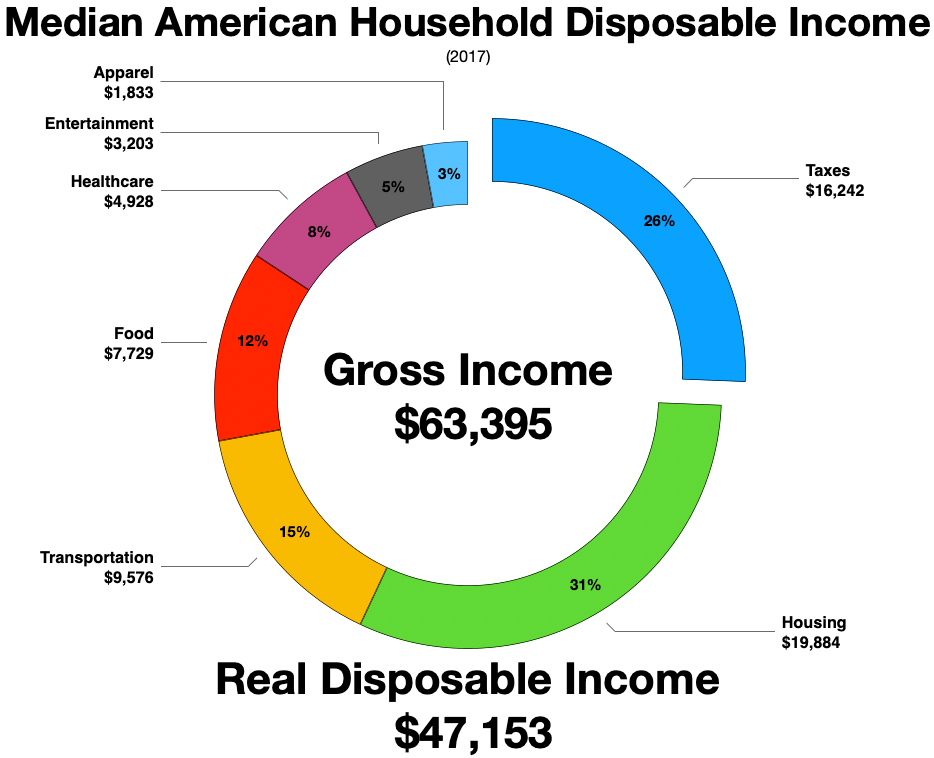Disposable Income on:
[Wikipedia]
[Google]
[Amazon]

 Disposable income is total
Disposable income is total
A simple discretionary income calculator
��even though this says it's measuring "disposable income," using the economist's language, it's discretionary income. * Eurostat, News Release No. 60/2010
Household Savings and Disposable Income
30 April 2010 * Eurostat, Statistics Explained, Glossary article
National Disposable Income
OECD Disposable income statistics
Google – public data
GDP and Personal Income of the U.S. (annual): Disposal Personal Income
Google – public data
GDP and Personal Income of the U.S. (annual): Disposal Personal Income per capita {{Authority control Personal taxes Household income Family economics National accounts

 Disposable income is total
Disposable income is total personal income
In economics, personal income refers to the total earnings of an individual from various sources such as wages, investment ventures, and other sources of income. It encompasses all the products and money received by an individual.
Personal inco ...
minus current taxes on income. In national accounting, personal income
In economics, personal income refers to the total earnings of an individual from various sources such as wages, investment ventures, and other sources of income. It encompasses all the products and money received by an individual.
Personal inco ...
minus personal current taxes equals disposable personal income or household disposable income. Subtracting personal outlays (which includes the major category of personal r privateconsumption expenditure) yields personal (or, private) savings
Wealth is the abundance of valuable financial assets or physical possessions which can be converted into a form that can be used for transactions. This includes the core meaning as held in the originating Old English word , which is from an ...
, hence the income left after paying away all the taxes is referred to as disposable income.
Restated, consumption expenditure plus savings equals disposable income after accounting for transfers such as payments to children in school or elderly parents' living and care arrangements.
The marginal propensity to consume (MPC) is the fraction of a change in disposable income that is consumed. For example, if disposable income rises by $100, and $65 of that $100 is consumed, the MPC is 65%. Restated, the marginal propensity to save is 35%.
For the purposes of calculating the amount of income subject to garnishments, United States' federal law defines disposable income as an individual's compensation (including salary, overtime, bonuses, commission, and paid leave) after the deduction of health insurance premiums and any amounts required to be deducted by law. Amounts required to be deducted by law include federal, state, and local taxes, state unemployment and disability taxes, social security taxes, and other garnishments or levies, but does not include such deductions as voluntary retirement contributions and transportation deductions. Those deductions would be made only after calculating the amount of the garnishment or levy. The definition of disposable income varies for the purpose of state and local garnishments and levies.
The consumer leverage ratio is the expression of the ratio of total household debt to disposable income.
Meanings of disposable income
Disposable income can be understood as: * National disposable income of a country: The national income minus current transfers (current taxes on income, wealth etc., social contributions, social benefits and other current transfers), plus current transfers receivable by resident units from the rest of the world. * Disposable personal (or family/household) income: The income that individuals or households have for their spending.Discretionary income
Discretionary income is disposable income (after-tax income), minus all payments that are necessary to meet current bills. It is total personal income after subtracting taxes and minimal survival expenses (such as food, medicine, rent ormortgage
A mortgage loan or simply mortgage (), in civil law (legal system), civil law jurisdictions known also as a hypothec loan, is a loan used either by purchasers of real property to raise funds to buy real estate, or by existing property owners t ...
, utilities, insurance, transportation, property maintenance, child support, etc.) to maintain a certain standard of living
Standard of living is the level of income, comforts and services available to an individual, community or society. A contributing factor to an individual's quality of life, standard of living is generally concerned with objective metrics outsid ...
. Expenses that persist with zero income are termed autonomous consumption. Discretionary income is the amount of an individual's income available for spending after the essentials have been taken care of:
:
:
The term "disposable income" is often incorrectly used to denote discretionary income. For example, people commonly refer to disposable income as the amount of "play money" left to spend or save.
In the national accounts
The system of national accounts defined the concept of disposable income for all institutional sectors of the economy. For corporations it is equal to profit retained, and for the government it is equal totaxes
A tax is a mandatory financial charge or levy imposed on an individual or legal entity by a governmental organization to support government spending and public expenditures collectively or to regulate and reduce negative externalities. Tax co ...
+ income received from public corporation. The sum of disposable income across all institutional sectors is called the national disposable income.
See also
* List of countries by disposable income * List of countries by GNI per capita growthReferences
External links
A simple discretionary income calculator
��even though this says it's measuring "disposable income," using the economist's language, it's discretionary income. * Eurostat, News Release No. 60/2010
Household Savings and Disposable Income
30 April 2010 * Eurostat, Statistics Explained, Glossary article
National Disposable Income
OECD Disposable income statistics
Google – public data
GDP and Personal Income of the U.S. (annual): Disposal Personal Income
Google – public data
GDP and Personal Income of the U.S. (annual): Disposal Personal Income per capita {{Authority control Personal taxes Household income Family economics National accounts